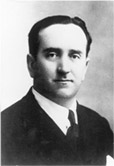 The Auxiliary Navy of the Basque Country was one of the most unusual and least known military units that took part in the 1936-1939 Civil War. It exclusively answered to the Basque Government, which meant that it was also highly politically significant. It was established in October 1936 by the Basque Government’s Ministry of Defence to help the Republican Navy to protect maritime traffic and fishing in its own coastal waters and keep the accesses to Basque ports free from underwater mines. The outcome of the military and political circumstances of the conflict – particularly the fact that the North was cut off from the rest territory controlled by the government forces, the poor performance of the Republican Cantabrian Sea Naval Forces (Cantabrian Sea is the Spanish name for the Bay of Biscay), which led to tension between the commands of both forces and ended in mutual distrust, and the character of the head of the Auxiliary Navy, Joaquín de Egia, was that the latter became totally autonomous from the Republican Navy, both from an organizational and operational point of view.
The Auxiliary Navy of the Basque Country was one of the most unusual and least known military units that took part in the 1936-1939 Civil War. It exclusively answered to the Basque Government, which meant that it was also highly politically significant. It was established in October 1936 by the Basque Government’s Ministry of Defence to help the Republican Navy to protect maritime traffic and fishing in its own coastal waters and keep the accesses to Basque ports free from underwater mines. The outcome of the military and political circumstances of the conflict – particularly the fact that the North was cut off from the rest territory controlled by the government forces, the poor performance of the Republican Cantabrian Sea Naval Forces (Cantabrian Sea is the Spanish name for the Bay of Biscay), which led to tension between the commands of both forces and ended in mutual distrust, and the character of the head of the Auxiliary Navy, Joaquín de Egia, was that the latter became totally autonomous from the Republican Navy, both from an organizational and operational point of view.
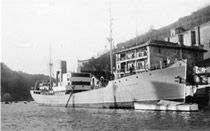 In order to organize this auxiliary force, Egia converted into “warships” a good number of fishing boats that were sheltering in Bilbao, but not being used for their real purpose. Most of them had arrived during the evacuation of Pasajes. There were fitted out with artillery in some cases (armed trawlers) or rigs for sweeping underwater mines in others (mine sweepers). All the vessels were painted lead grey and the initial of their name or equivalent numeral painted in black on their rigging. They flew the ikurriña (Basque flag) at the bow and the Republican tricolour flag at the stern. The crews were made up of volunteers, from the fishing and merchant navy fleets. They made up for their lack or no military training with their commitment, discipline and high motivation. More than 900 passed through the ranks of the Basque Country Navy.
In order to organize this auxiliary force, Egia converted into “warships” a good number of fishing boats that were sheltering in Bilbao, but not being used for their real purpose. Most of them had arrived during the evacuation of Pasajes. There were fitted out with artillery in some cases (armed trawlers) or rigs for sweeping underwater mines in others (mine sweepers). All the vessels were painted lead grey and the initial of their name or equivalent numeral painted in black on their rigging. They flew the ikurriña (Basque flag) at the bow and the Republican tricolour flag at the stern. The crews were made up of volunteers, from the fishing and merchant navy fleets. They made up for their lack or no military training with their commitment, discipline and high motivation. More than 900 passed through the ranks of the Basque Country Navy.
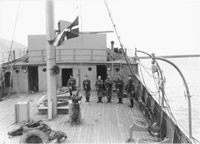 Despite the tension with the Republican naval authorities, the Auxiliary Navy cooperated with the Cantabrian Sea Naval Forces and covered its shortages as far it could with its limited resources. It escorted the merchant vessels and swept for mines in Basque waters. It played a key role in the Republican side in the naval campaign during the first half of 1937.
Despite the tension with the Republican naval authorities, the Auxiliary Navy cooperated with the Cantabrian Sea Naval Forces and covered its shortages as far it could with its limited resources. It escorted the merchant vessels and swept for mines in Basque waters. It played a key role in the Republican side in the naval campaign during the first half of 1937.
The fall of Bilbao in June 1937 forced the Basque ships to move to Santander, where the mine sweepers continued with their work of keeping the waters clear of mines. Some of the vessels, with their crews, were transferred to the Cantabrian Sea Naval Forces and would then operate in Asturias. The evacuation of Santander in August 1937 put an end to its activities, even though, on paper, it continued to exist for several more months. Some of its members would be taken prisoner, but the majority managed to make it to France.
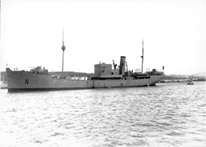 Roughly half the exiles would remain on French soil until the end of the war or, in some isolated cases, would move to Franco-controlled territory. The other half would return to government-controlled territory to continue fighting in the Republican Navy or one of the branches of the police force, the Sea Carabineers or Cuerpo de Carabineros.
Roughly half the exiles would remain on French soil until the end of the war or, in some isolated cases, would move to Franco-controlled territory. The other half would return to government-controlled territory to continue fighting in the Republican Navy or one of the branches of the police force, the Sea Carabineers or Cuerpo de Carabineros. 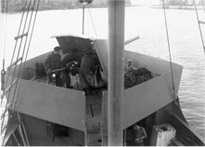 The most unusual case was perhaps the Sea Carabineers, where the Basque Government, which was then based in Barcelona, organized a huge entry of sailors from the Auxiliary Navy and also from the Basque Merchant Navy. These sailors worked as crew on a flotilla of sailing-boats and motorboats, dependent on the Treasury, and their mission was to ensure the route between the ports of the Republican Levante (Eastern Spain) was kept open until the end of the war. Then came the repression or exile – for some a new war – and, in the best of cases, the return to their normal work, which was never easy to accomplish.
The most unusual case was perhaps the Sea Carabineers, where the Basque Government, which was then based in Barcelona, organized a huge entry of sailors from the Auxiliary Navy and also from the Basque Merchant Navy. These sailors worked as crew on a flotilla of sailing-boats and motorboats, dependent on the Treasury, and their mission was to ensure the route between the ports of the Republican Levante (Eastern Spain) was kept open until the end of the war. Then came the repression or exile – for some a new war – and, in the best of cases, the return to their normal work, which was never easy to accomplish.
